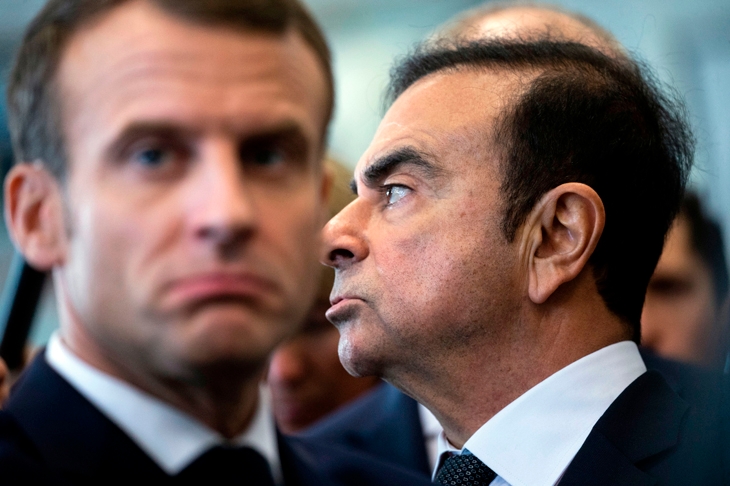In France after New Year, the only gilets jaunes I spotted were a rather dejected bunch near an autoroute exit. I was ready to give them a cheery thumbs-up rather than risk having my path blocked, but they took no notice of me — and no one I met expressed support for them. The novelty has worn off and sensible French citizens are horrified that the protests have led to deaths in car and lorry accidents at the barricades. On the other hand, most people are also very offended by the rising living costs, high taxes, poor economic prospects and irrelevant green initiatives that provoked the protests in the first place — and no one I met expressed a word of support or sympathy for Emmanuel Macron, the rumour-dogged president who, after less than two years in office, has become the definition of a busted flush.
This self-obsession with domestic troubles meant, incidentally, that none of my local acquaintances, whether French or expats from elsewhere in the EU, wanted to talk about Brexit. A year ago in the same company, I was repeatedly harangued. This time, ‘Votre hypothèse est aussi bonne que la mienne’ was sufficient response to kill the topic if it came up.
And another thing no one seemed bothered about was the fate of Carlos Ghosn, the high-profile Renault chief executive and former Nissan chairman who appeared handcuffed in a Tokyo court this week to state his defence against charges of financial misconduct, having been detained there since November. Given the importance of Renault as a French industrial champion and suspicions of a Japanese plot to disgrace Ghosn in order to unhitch Nissan from Renault’s control, the French government might have been expected to intervene at the highest level. But the last thing Macron wants right now is to be seen standing up for a multimillionaire accused of misusing company money. Equivocal statements from Finance Minister Bruno Le Maire suggest the Élysée Palace is quite happy to leave Ghosn shivering in his cell.
Herb the pioneer
I flew to France on Flybe, and can report that the financially stretched low-cost airline still offers a pleasant, on-time service despite its scramble to find a new owner: Virgin Atlantic was the most recent rumoured buyer. While travelling, I read obituaries of Herb Kelleher, who co-founded Southwest Airlines, the carrier that broke the US airline cartel by introducing $15 flights in 1971 and now carries 120 million passengers per year.
Almost every aspect of what we’ve come to think of as the Ryanair business model — single-aircraft-type fleets, fast turnaround, minimum staffing — was pioneered by the rumbustious Kelleher. But he also brought a human warmth to his business which (in contrast to Ryanair’s Michael O’Leary) won the affection of flight crews and customers, as well as shareholders such as Warren Buffett. If I had a glass of his favourite Wild Turkey bourbon to hand, I’d raise it to Herb.
Pain or gain?
Against a background of drooping eurozone growth (the consensus forecast is 1.6 per cent this year) I also met no one in France who was celebrating the 20th birthday of the euro, despite European Commission president Jean-Claude Juncker’s imaginative toast to it as ‘a symbol of unity, sovereignty and stability [that] has delivered prosperity and protection for our citizens’. The French associate the euro with the inflation that is stoking unrest, but only the very old feel nostalgic for the franc (and they tend to mean the pre-1960 ‘old franc’, of which there were 100 to the new one).
In summary, southern Europeans, especially Greeks, regard the euro as an instrument of German hegemony, while for Beneluxers like Juncker, it’s clearly more efficient than the tinpot currencies they had before. The Irish regret gambling with it in their ‘Celtic tiger’ days but still see it as a symbol of progress. The Germans regard it as a cost of cementing the European project but hanker for the deutsche mark which was such a focus of national pride.
The broader truth is that all but the most radical EU fringe regard the euro as a fact of life and no one expects it to fall apart any time soon, even if it might not last forever. Does that mean — contrary to the tub-thumpings of Brexiteers — that the single currency has conclusively proved its worth? As a blunt instrument of Juncker’s ‘unity’, maybe: as an engine of prosperity, no.
Forgotten are the golden rewards predicted before the euro’s 1999 launch. But an old notebook tells me precisely how EU commissioner for economic and financial affairs Yves Thibault de Silguy replied in January 1998 when I asked him what the new currency’s economic impact would be: ‘1 per cent extra growth and several hundred thousand jobs.’ Though we can never know what the counterfactual might have been, no one has subsequently claimed anything like such gains for the euro to compensate for pain caused in other ways.
Thanks for the memories
I could have filled this column many times over with readers’ pungent recollections of ‘the old City’ and suggestions as to where it can still be found. The popular Hatchet in Garlick Hill, mentioned last week, turns out to have had a facelift as the Three Cranes, but unaltered is ‘the Jampot’ — the Jamaica Wine House in St Michael’s Alley — with its divide between ‘public school types upstairs drinking Becks, draught beer for money men downstairs’. Likewise Sweetings, the seafood eaterie in Queen Victoria Street, ‘particularly the bar on the left’ where in the 1970s a waiter called George would chip in with his views on basis points over Libor for syndicated loans to Latin America. Honourable mentions too for the Bow Wine Vaults in Bow Churchyard and the refurbed but still authentic Olde Wine Shades in Martin Lane. Enough on this theme for now — more than enough for a serious pub crawl — but thank you for the memory tour.







Comments